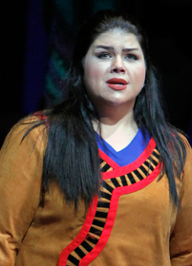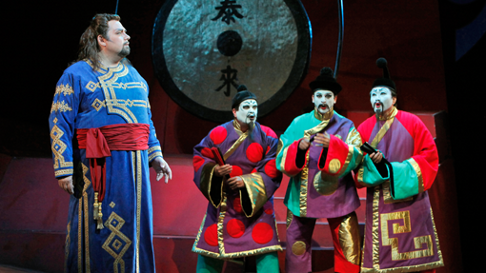Recently in Reviews
English Touring Opera are delighted to announce a season of lyric monodramas to tour nationally from October to December. The season features music for solo singer and piano by Argento, Britten, Tippett and Shostakovich with a bold and inventive approach to making opera during social distancing.
This tenth of ten Live from London concerts was in fact a recorded live performance from California. It was no less enjoyable for that, and it was also uplifting to learn that this wasn’t in fact the ‘last’ LfL event that we will be able to enjoy, courtesy of VOCES8 and their fellow vocal ensembles (more below …).
Ever since Wigmore Hall announced their superb series of autumn concerts, all streamed live and available free of charge, I’d been looking forward to this song recital by Ian Bostridge and Imogen Cooper.
The Sixteen continues its exploration of Henry Purcell’s Welcome Songs for Charles II. As with Robert King’s pioneering Purcell series begun over thirty years ago for Hyperion, Harry Christophers is recording two Welcome Songs per disc.
Although Stile Antico’s programme article for their Live from London recital introduced their selection from the many treasures of the English Renaissance in the context of the theological debates and upheavals of the Tudor and Elizabethan years, their performance was more evocative of private chamber music than of public liturgy.
In February this year, Albanian soprano Ermonela Jaho made a highly lauded debut recital at Wigmore Hall - a concert which both celebrated Opera Rara’s 50th anniversary and honoured the career of the Italian soprano Rosina Storchio (1872-1945), the star of verismo who created the title roles in Leoncavallo’s La bohème and Zazà, Mascagni’s Lodoletta and Puccini’s Madama Butterfly.
Evidently, face masks don’t stifle appreciative “Bravo!”s. And, reducing audience numbers doesn’t lower the volume of such acclamations. For, the audience at Wigmore Hall gave soprano Elizabeth Llewellyn and pianist Simon Lepper a greatly deserved warm reception and hearty response following this lunchtime recital of late-Romantic song.
Collapsology. Or, perhaps we should use the French word ‘Collapsologie’ because this is a transdisciplinary idea pretty much advocated by a series of French theorists - and apparently, mostly French theorists. It in essence focuses on the imminent collapse of modern society and all its layers - a series of escalating crises on a global scale: environmental, economic, geopolitical, governmental; the list is extensive.
For this week’s Live from London vocal recital we moved from the home of VOCES8, St Anne and St Agnes in the City of London, to Kings Place, where The Sixteen - who have been associate artists at the venue for some time - presented a programme of music and words bound together by the theme of ‘reflection’.
'Such is your divine Disposation that both you excellently understand, and royally entertaine the Exercise of Musicke.’
Amongst an avalanche of new Mahler recordings appearing at the moment (Das Lied von der Erde seems to be the most favoured, with three) this 1991 Mahler Second from the 2nd Kassel MahlerFest is one of the more interesting releases.
‘And there was war in heaven: Michael and his angels fought against the dragon; and the dragon fought and his angels, And prevailed not; neither was their place found any more in heaven … that old serpent … Satan, which deceiveth the whole world: he was cast out into the earth, and his angels were cast out with him.’
If there is one myth, it seems believed by some people today, that probably needs shattering it is that post-war recordings or performances of Wagner operas were always of exceptional quality. This 1949 Hamburg Tristan und Isolde is one of those recordings - though quite who is to blame for its many problems takes quite some unearthing.
There was never any doubt that the fifth of the twelve Met Stars Live in Concert broadcasts was going to be a palpably intense and vivid event, as well as a musically stunning and theatrically enervating experience.
‘Love’ was the theme for this Live from London performance by Apollo5. Given the complexity and diversity of that human emotion, and Apollo5’s reputation for versatility and diverse repertoire, ranging from Renaissance choral music to jazz, from contemporary classical works to popular song, it was no surprise that their programme spanned 500 years and several musical styles.
The Academy of St Martin in the Fields have titled their autumn series of eight concerts - which are taking place at 5pm and 7.30pm on two Saturdays each month at their home venue in Trafalgar Square, and being filmed for streaming the following Thursday - ‘re:connect’.
The London Symphony Orchestra opened their Autumn 2020 season with a homage to Oliver Knussen, who died at the age of 66 in July 2018. The programme traced a national musical lineage through the twentieth century, from Britten to Knussen, on to Mark-Anthony Turnage, and entwining the LSO and Rattle too.
With the Live from London digital vocal festival entering the second half of the series, the festival’s host, VOCES8, returned to their home at St Annes and St Agnes in the City of London to present a sequence of ‘Choral Dances’ - vocal music inspired by dance, embracing diverse genres from the Renaissance madrigal to swing jazz.
Just a few unison string wriggles from the opening of Mozart’s overture to Le nozze di Figaro are enough to make any opera-lover perch on the edge of their seat, in excited anticipation of the drama in music to come, so there could be no other curtain-raiser for this Gala Concert at the Royal Opera House, the latest instalment from ‘their House’ to ‘our houses’.
"Before the ending of the day, creator of all things, we pray that, with your accustomed mercy, you may watch over us."
Reviews
![Iréne Theorin as Turandot [Photo by Cory Weaver courtesy of San Francisco Opera]](http://www.operatoday.com/Turandot-20.png)
21 Sep 2011
Turandot in San Francisco
Los Angeles has been good to Turandot. The gritty 1984 Andre Serban production inaugurated an opera company in Los Angeles where a mere eight years later L.A. Opera bestowed the splendid Luciano Berio ending upon the world in an uber-pompous Gian-Carlo del Monaco production.
Meanwhile that same year (1992) Los Angeles artist David Hockney bestowed a Turandot upon San Francisco (and Chicago) that is pure Tinseltown. L.A. is famously the Hockney muse, thus the specific muse for the technicolor Hockney Turandot has to have been Grauman’s Chinese Theater. Like this National Historic Monument, the Hockney Turandot vibrates in theatrical shapes and Chinese red, and by now it too is an historic monument.
San Francisco has put its unique stamp solidly on Turandot as well. The 1977 Jean-Pierre Ponnelle production had its massive stone Buddha that gestured and wept blood when the steely Monserrat Caballé succumbed to Luciano Pavarotti in their role debuts, this back in the days when San Francisco Opera pushed the progressive opera envelope in the U.S.
 Leah Crocetto as Liù
Leah Crocetto as Liù
These days it is a bit different in San Francisco. There is a stamp of a different sort, it is musical and it too pushes the envelope. Specifically it is the quixotic Italian conductor Nicola Luisotti who makes every score he touches vibrate with color, energy and sometimes questionable theatricality. Put this together with the timeless Hockney Turandot and you hit remarkable pay dirt — the current Turandot in San Francisco!
The Hockney Turandot is, no surprise, like a painting in that it is two dimensional. On this flat surface Ping, Pang and Pong complain, Liu sacrifices, Calaf thunders and Turandot rages. The lack of depth plays directly into the hands of the maestro who likes his singers right downstage center where he communes mightily with his voices and maybe even with Puccini. The current staging by Carnett Bruce is sensitive to artist, character and story telling, and it is precise and efficient in somehow getting and keeping the artists where the maestro wants them and where Hockney surely saw them.
The performance was riveting from beginning to end. Even so there were those scenes that glowed with new life — the Ping, Pang, Pong conversation for example, made intimate by the three Hockney straight backed chairs painted onto a drop and by the maestro’s oh-so smooth intermingling of their vocal lines. Liu’s first act prayer 'Signore ascolta' was magical in its Adler Fellows innocence, and the Alfani duet (“who is Berio?” Luisotti surely would ask) that ends the opera was articulated with a surprising intimacy that made us actually feel a renewed humanity — no small feat amidst all that bombast.
 Marco Berti as Calaf, Gred Fedderly as Pang, Daniel Montenegro as Pong and Hyung Yun as Ping
Marco Berti as Calaf, Gred Fedderly as Pang, Daniel Montenegro as Pong and Hyung Yun as Ping
The biggest vocal presence was Italian tenor Marco Berti as Calaf who used his strangely brutal 'Nessun dorma' to threaten the Chinese royalty and population even more, and more quickly dismiss Liu’s sacrifice. Swedish soprano Iréne Theorin was far more lyrical in her capitulation than the usual Turandot, though there was icy rage aplenty as she well anchored this story of anger versus power. Against this big house firepower the Liu of Adler Fellow Leah Crocetto was indeed sacrificial, a sacrifice of this symbolic character who must fully embody the supernal power of love. The mix of musical cultures does not work — the Adlers are specifically nurtured contemporary artists whose sophistication is at odds with can belto international artists.
The Timur of Raymond Aceto fulfilled its narrative obligations without adding pathos. The Ping of Hyung Yun dominated the trio of courtiers in association with the vivid Pang of L.A. character tenor Greg Fedderly. Pong was Adler Fellow Daniel Montenegro.
The visual sophistication of the David Hockney Turandot begs precise and brilliant lighting, a need recognized from the inception of this production those many years ago. Just now the lighting was reconfigured by Christopher Maravich though the ending was new. Mo. Luisotti endowed the final chord of the performance with an intense, nearly screaming crescendo that was matched by a crescendo of bright, brighter, blinding light.
Theatrical! No?
Michael Milenski
![Iréne Theorin as Turandot [Photo by Cory Weaver courtesy of San Francisco Opera]](http://www.operatoday.com/Turandot-20.png)

